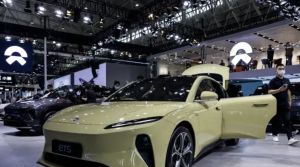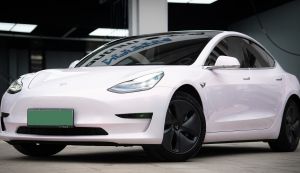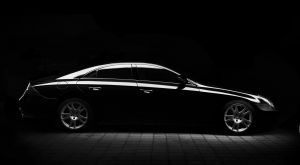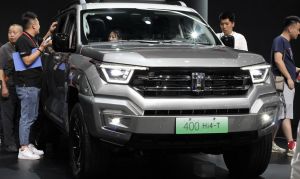Shares of Nio Inc., a prominent Chinese electric vehicle manufacturer, surged by 20% on Thursday following news of a significant increase in vehicle deliveries for the month of April. The company's Hong Kong-listed shares soared by as much as 23% to reach 44.20 Hong Kong dollars, marking their highest level in over six weeks. Nio's robust performance also contributed to a 2% increase in the broader Hang Seng index during midday trading.
Nio reported a remarkable year-on-year increase of 134.6% in vehicle deliveries for April, with a total of 15,620 vehicles delivered. The delivery breakdown included 8,817 premium smart electric SUVs and 6,803 premium smart electric sedans, as stated in the company's statement released on Wednesday. So far this year, Nio has delivered 45,673 vehicles, representing a 21.2% increase compared to the same period last year.
In addition to bolstering its vehicle deliveries, Nio has been actively expanding its battery swap partnerships, aiming to enhance the infrastructure aspect of the electric vehicle ecosystem. These efforts are geared towards alleviating consumer concerns regarding driving range limitations.
Other major Chinese electric vehicle manufacturers, including Li Auto, Xpeng, and BYD, also reported their April deliveries on Wednesday. Li Auto delivered 25,787 vehicles in April, experiencing an 11% decline compared to March. Meanwhile, Xpeng reported a 4% increase in April deliveries, totaling 9,393 EVs. BYD's sales volume for EVs in April reached 313,245 units, marking a 3.6% increase from March.
Amidst escalating competition in the Chinese electric vehicle market, manufacturers have engaged in a price war, particularly with U.S. automaker Tesla. Various EV makers have slashed prices as they strive to outperform Tesla by offering advanced technology and competitive pricing strategies. Tesla recently reduced the starting price of its Model 3 in China and other key markets, prompting similar moves from competitors like Li Auto.
The intensifying competition saw Chinese smartphone giant Xiaomi entering the electric vehicle market in early April with the launch of its SU7 electric car. Priced approximately $4,000 lower than Tesla's Model 3, Xiaomi aims to capture market share by offering a longer driving range. Despite selling its new EV at a lower price point, Xiaomi's CEO Lei Jun expressed optimism about the vehicle's sales performance, indicating a potential to achieve profitability sooner than expected.
Chinese automotive giant BYD has reported a significant decrease in profits, attributing it to reduced demand for electric vehicles (EVs) and intensified competition in the global automotive landscape. The company disclosed that it generated $630 million (£502 million) in the first quarter of the year, marking a notable drop of over 47% compared to the preceding quarter.
As BYD vies with Elon Musk's Tesla for dominance in the EV market, it has encountered challenges in maintaining its position as the world's leading EV seller. Despite briefly surpassing Tesla in sales at the end of last year, the US-based Tesla reclaimed the top spot earlier this month.
BYD's sales of battery-only cars totaled just over 300,000 units in the first quarter, a decrease from the record-breaking 526,000 units sold in the final quarter of 2023. The company's latest financial results indicate a potentially more favorable performance compared to Tesla, which recently reported its first quarterly revenue decline since the onset of the pandemic in 2020.
Amidst a price war among EV manufacturers in China, BYD and its competitors are grappling for market share amid a backdrop of slower economic growth. To stimulate demand, BYD has implemented price reductions on select models, aiming to attract buyers who exhibit greater caution in making substantial purchases like cars.
In response to softer demand within China, BYD has embarked on an expansion into new international markets. The company exported 240,000 vehicles in 2023 and anticipates a significant increase in exports this year. However, its aggressive expansion strategy has triggered concerns in the US and Europe, where governments are inclined to safeguard the interests of domestic automakers.
In addition to bolstering its export initiatives, BYD has diversified its product portfolio by introducing higher-end models. At the Beijing auto show, the company showcased its latest luxury vehicles, underscoring its commitment to innovation and market expansion despite prevailing challenges in the EV sector.
China's largest auto show kicked off in Beijing on Thursday with a dazzling display of the latest electric vehicles (EVs) from top automakers, underscoring the nation's position as the world's largest electric vehicle market.
Automakers are gearing up to reveal 117 new models, a notable increase from last year's 93 showcased in Shanghai. Organizers reported a total of 278 new energy vehicles (NEVs) set to debut, seven more than the previous year. This surge in innovation comes as NEV sales reached a milestone in early April, constituting over 50% of car sales in China, according to auto association data.
The industry has witnessed a fierce price war over the past year, driving down profit margins as automakers vie to introduce newer, more affordable models and enticing promotions.
"At the Beijing auto show, there's no denying the waning interest in gasoline vehicles. Everyone is seeking the latest advancements in intelligence and electrification," remarked William Li, founder and CEO of Chinese EV maker Nio (9866.HK), speaking to Reuters. "If you attend, there's no question about EVs anymore. It's not just the future; it's the present."
Chinese manufacturers like BYD (002594.SZ) and newcomer Xiaomi (1810.HK) attracted crowds, with Xiaomi stealing the spotlight by hosting one of the earliest press events. Xiaomi CEO Lei Jun revealed impressive pre-orders for its SU7 sedan, including buyers who previously owned vehicles from BMW (BMWG.DE) and Audi. BYD, the world's largest EV maker, showcased its premium brands Yangwang and Denza in a bid to shift its image from a budget automaker.
Foreign automakers, eager to realign their strategies with China's electric shift, announced plans to bolster local production and research. Nissan Motor (7201.T) and Mazda Motor (7261.T) from Japan unveiled models tailored for Chinese drivers, while General Motors (GM.N) excluded traditional engine vehicles from its lineup for the first time. Mercedes Benz (MBGn.DE) dismissed rumors of abandoning electrification as it unveiled a lineup of new EVs.
Tesla (TSLA.O) notably skipped the show again, following an incident in 2021 where a disgruntled customer protested atop a displayed Tesla over brake complaints.
Chinese brands outlined ambitious overseas plans, emphasizing innovation amid concerns of industry overcapacity in Europe and the U.S.
"As the Chinese automotive industry enters a new era of globalization and domestic brands gain strength, the emergence of Chinese vehicles on the world stage is a growing trend," noted Great Wall Motor (601633.SS) President Mu Feng.
Smart driving technologies took center stage, with domestically developed advanced driving assistance systems rivaling Tesla's Full Self-Driving (FSD). Companies like Seres (601127.SS) and Guangzhou Automobile Group (GAC) (601238.SS) showcased systems supplied by Huawei Technologies (HWT.UL), while others like BYD and XPeng (9868.HK) touted in-house developed features.
BYD announced plans to launch revamped models equipped with its self-developed advanced driving assistance system (ADAS), while XPeng pledged to continuously upgrade software to maintain a competitive edge.
GAC revealed intentions to introduce flagship models with Huawei's ADAS from January 2025, one of several state-owned automakers partnering with Huawei to leverage its technology.
"Huawei leads in advanced assistance driving capabilities," stated GAC General Manager Feng Xingya. "We are committed to ensuring that GAC products offer the most advanced technologies to consumers."
Great Wall Motor's Global Odyssey: Navigating Challenges Towards Ambitious Overseas Sales Goals
Great Wall Motor is setting its sights on the global stage, aiming to surpass 1 million units in overseas sales by 2030, with a significant portion being premium models, according to an announcement made on its official WeChat account. This new target marks a shift from its previous goal outlined in October last year, where the company aimed for annual overseas sales of 1 million units by 2025, including 400,000 units produced locally abroad.
With 27 years of experience pioneering overseas markets, Great Wall Motor is ramping up its investment efforts abroad, integrating its research and development, production, supply, sales, and service systems under its single brand umbrella. The automaker boasts a widespread presence, having exported vehicles to over 170 countries and regions, with a network of more than 1,000 sales outlets worldwide.
Despite its ambitious plans and solid global footing, Great Wall Motor's trajectory has faced delays, particularly amidst a challenging market landscape. This includes an anti-subsidy investigation initiated by the European Commission into imports of battery electric vehicles from China, a move that prompted Great Wall Motor to respond swiftly and strategically, including the establishment of a European R&D center.
Notably, Great Wall Motor's vice president and head of overseas business, Shi Qingke, reiterated the company's commitment to achieving the 1 million annual sales target by 2025, with a substantial portion of those units being locally manufactured abroad. In 2023, Great Wall Motor recorded impressive sales figures, totaling over 1.2 million vehicles, with overseas sales surging by over 82%, contributing significantly to its overall performance.
As Great Wall Motor navigates the complexities of global markets, its revised timeline underscores a pragmatic approach to ensure sustainable growth and continued success on the international stage.








